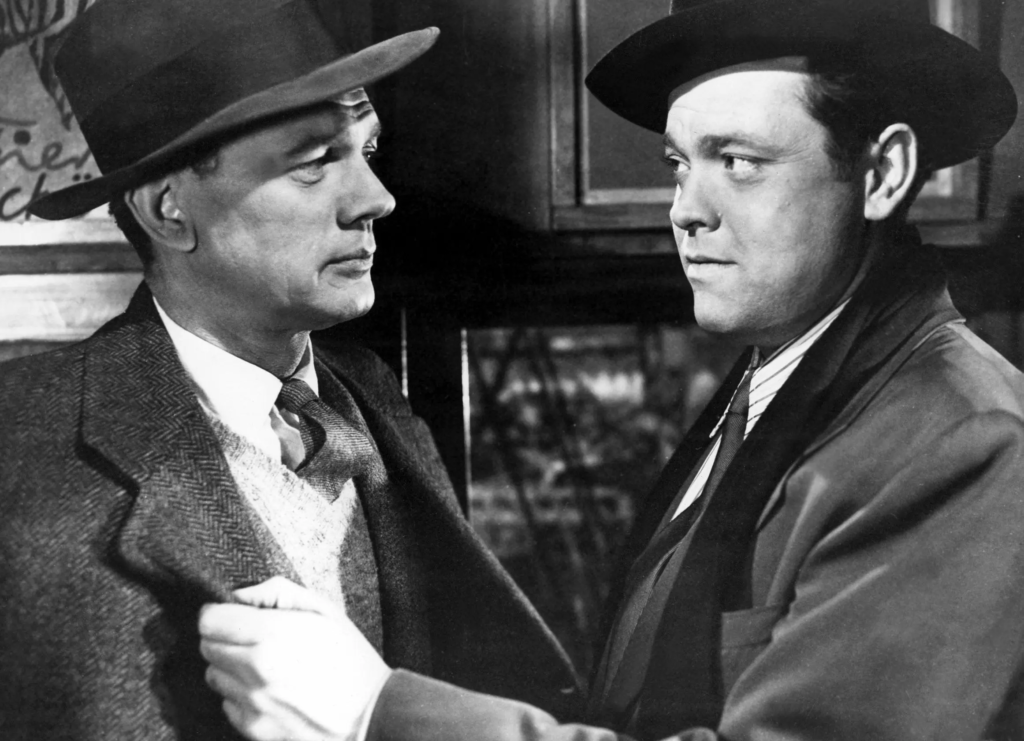Director: Carol Reed
Writer: Graham Green, Orson Welles, Alexander Korda
Stars: Orson Welles, Joseph Cotten, Alida Valli
Synopsis: Pulp novelist Holly Martins travels to shadowy, postwar Vienna, only to find himself investigating the mysterious death of an old friend, Harry Lime.
Just a few years after the end of World War II, Austria was occupied by the Allies and the capital of Vienna was split into sectors like Berlin was. American author Holly Martins (Joseph Cotten) arrives to take a job from his friend Harry Lime (Orson Welles), but is told that Lime was struck by a car and killed. Learning more about Harry’s death, Martins first meets Lime’s girlfriend (Alida Valli), then talks to British Major Calloway (Trevor Howard), who reveals that Lime was under investigation for stealing medicine from hospitals and reselling it on the black market in diluted forms. Preparing to go back to America, Martins is shocked one night to find Harry Lime is alive and well…and in hiding.

Writer Graham Greene, one of the best writers of crime in the 20th century, penned his original screenplay of this post-war noir for titan producers Alexander Korda and David O. Selznick and director Carol Reed (Oliver!). Out of it came an instant classic which remains among the greatest pictures produced in British film history and one of the most memorable ones of the 1940s. Early strains of the Cold War create the atmosphere of unsettled politics and exploiting the desperation of the citizens in need. Vienna’s ruins, surviving attractions, and labyrinth of their sewers served as a perfect set to film the action which Greene went through and incorporated into his script.
For Reed, it marked the pinnacle of his career as Britain’s top director following the massive success of Odd Man Out and The Fallen Idol, winning the first BAFTAs presented for Best Film as well as the Palme d’Or at Cannes for this film. He was still twenty years away from an Oscar win, but Reed’s command of mystery stories was undeniable. He utilized unusual camera angles, the Dutch angle most famously, to keep a sense of unbalance with every moment that was taking place. Holly Martins was never walking a straight line in his search for Harry and the truth behind his “death.” It is a topsy-turvy run through every street and every passage in the sewers for Martins to find the real truth.
The star of the film was Orson Welles, who embodied the perfect enigma of a man with many secrets. Welles, despite the acclaim of Citizen Kane and The Lady From Shanghai, did not direct the film and was famously troublesome during production. He came to Vienna late in production and refused to film the sewer scenes on location, forcing the rebuilding of the sets in England. While in Vienna, he drank openly and caused problems with officials in all four sectors, nearly being arrested. (He allegedly called a Russian soldier a “c***sucker,” but thankfully that soldier knew zero English.) The International Police Headquarters was run by the Americans, who saved Welles from any serious repercussions.

There was one big positive thing Welles added to his character. While he refuted claims that he co-directed the film with Reed, Welles wasn’t a big fan of Greene’s dialogue and would sometimes ad-lib or rewrite his own lines. The most famous scene in the film was Lime and Martins on the ferris wheel, the Riesenrad, and Lime being confronted with the accusations of stealing penicillin. He responds with a monologue and completes it with these famous analogy, which, according to Greene, Welles actually wrote:
“You know what the fellow said—in Italy, for 30 years under the Borgias, they had warfare, terror, murder and bloodshed; but they produced Michelangelo, Leonardo da Vinci and the Renaissance. In Switzerland, they had brotherly love; they had 500 years of democracy and peace—and what did that produce? The cuckoo clock! So long, Harry.”
Accompanying the film was a delicate string score which added to the film’s status. Instead of an orchestrated piece, Reed hired zither player Anton Karas after hearing his melancholic music played from a cafe one day. After convincing Karas to come to London to record, Karas composed rather quickly what would be the theme song to the movie, which became an international hit and made the unknown Karas into a major star. There could not have been a better instrument to illustrate the constant unevenness Holly Martins is feeling, especially when encountering Lime. It isn’t overused and the sound comes in at the right moments, from Lime’s introduction (an all-time scene) to the melancholy end when Lime’s girlfriend walks by Martins and ignores him.
From its release, everybody knew this was an absolute masterpiece that would stand the test of time. The Third Man serves as this documented map of Austria after the war in its rebuilding state as well as the perfect mystery. The combination of a stellar script, perfect directing, and high-class acting carries through the film and shaped British cinema. In a film born out of rebuilding the future, Green, Reed, and the entire cast produce the fatalism of idealism of what a just world should have been, but that this life is, as always, a zero-sum game.





